Black Voters and the Fight for Democracy is a multi-part series that explores the stakes of the 2024 election for our communities. This project was produced as part of the Advancing Democracy Fellowship.
HARRISBURG, Pa. — “Are y’all bored? Who’s bored?”
Wearing mules, jeans, and a T-shirt emblazoned with the name of her nonprofit group — 1 Vote Counts — Michelle Mardenborough was speaking with around 80 mostly Black teenagers about the sanctity of the ballot box. It was 9 a.m. on the SciTech Campus of Harrisburg High School in Pennsylvania, and half an hour into the program, some students were antsy. They were, well, bored. And they let her know, shooting their hands into the air when she asked the above questions.
But Mardenborough, a decades-long organizer and Harrisburg native, was unfazed: “I love it. I love that you’re transparent. Why are you bored?” she asked. One boy replied that he just wasn’t interested in voting; it didn’t seem that significant. Another added that he wasn’t sure what a single vote could accomplish.
“I wish that I worked at this school. I really do,” Mardenborough said in a voice that was brimming with excitement. “You’d never be bored in my classroom. Never. Because as your teacher, I’d want you to hold me accountable for how you’re feeling. It’s the exact same thing with elected officials: You activate your personal power — and you hold them accountable through your vote.”
Not all the students were tuned out. Afterward, two girls hustled over to Veronica Belcher, the 1 Vote Counts field director, to sign up to be canvassers, and Mardenborough’s niece, Sanaii Henry, a senior, had assisted with that morning’s program.
Still, the apathy some students showed reflects a broader challenge for organizers — a challenge that’s especially acute in Pennsylvania, North Carolina, Michigan, and other battleground states, where presidential and statewide races are routinely decided by razor-thin margins and where more than a third of Black eligible voters live. Organizers are worried that a combination of exasperation with the political system and intensifying anti-Black voting legislation might throttle turnout during a critical election year.

To combat the issue, organizers are ramping up their engagement efforts. The objective is twofold: to listen deeply to Black voters’ concerns — the sky-high cost of various bills, poor access to health care, and the erosion of reproductive rights are top of mind for many — and then to help them connect the dots between those concerns and the people seeking office at all levels of government.
“Voter apathy is real, and we have to validate it. We can’t bark at people to go to the ballot box when we’re not acknowledging what they’re going through,” Jovita Lee, the program director of the nonprofit coalition the North Carolina Black Alliance, told Capital B. “So, what we’re doing is this: validating how folks are feeling, and also making sure that they know that some of the people responsible for how they’re feeling will be on the ballot in November.”
Frustration fueled by broken promises
One of organizers’ greatest fears? That voters will throw up their hands — that they’ll stay home.
“I’ve heard people, including Black Americans, say that they’re not interested in the political process. I’ve also heard them say that they’re not interested in the candidates. They don’t like former President Donald Trump. But they’re not too excited about President Joe Biden,” Norman Clement, the founder of the Detroit Change Initiative, a Michigan-based voter education and mobilization nonprofit, told Capital B.
He was referring to recent polls showing that Black voter enthusiasm for the president has slipped over the past few years. This dip is due to his administration’s poor messaging on its wins and its increasingly unpopular handling of the Israel-Hamas war, among other things. For Democrats, this apathy is particularly alarming: Black voters for more than half a century have formed the backbone of the Democratic Party, supporting its candidates at rates that outstrip other racial groups.
Yet dwindling enthusiasm for the candidate at the top of the ticket only partially explains the apathy that some Black voters feel. Another cause: frustration fueled by broken promises on state and local levels.
Sitting in a breezy room at Hurston Manor, a community space in Harrisburg, Kimeka Campbell, the co-founder of the area’s Young Professionals of Color collective, told Capital B that voters notice when elected officials choose to improve the lives of some and not others.
“There are figures who were popular for a while — but then they turned out to be garbage,” she said.
Campbell specifically mentioned the late Stephen Reed, who was Harrisburg’s Democratic mayor for almost three decades, from 1982 to 2010. In 2015, he faced nearly 500 criminal charges for using hundreds of millions of taxpayer dollars on a museum project that never materialized and on an incinerator complex that plunged the city’s government into fiscal collapse. Ultimately, he pleaded guilty to just 20 counts of theft and received a two-year probation for the crimes he committed while he was in office.
Though the Reed scandal might appear a little bit extreme, it sheds light on why voters, and especially Black voters, in Harrisburg and beyond have something like collective PTSD when it comes to civic engagement.
“Many Black Americans are disillusioned with politics because of pledges made to their communities that weren’t delivered on,” Campbell said. “I hear people say, ‘Why would I vote? These people don’t have my interests at heart, and I don’t want to subject myself to thinking about it.’”
For young Black voters, apathy might spring from something else, too: the anemic state of civics education in the classroom.
“For us, the big challenge with young folks is trying to overcome the fact that civics has been taken out of a lot of schools — that their teachers aren’t teaching them everything they need to know to understand the importance of voting and then get registered to vote,” Kadida Kenner, the founding chief executive officer of the New Pennsylvania Project, a nonprofit voter mobilization group, told Capital B.
From the organization’s basement Harrisburg office — bedecked with photographs of revered Black figures including Bayard Rustin, Angela Davis, and Ida B. Wells — Kenner underscored that we ought to be careful about pointing the finger at educators.

“It’s probably not their fault. It’s the fact that we have groups such as Moms for Liberty that go into schools around the U.S. and disrupt public education,” she noted, referring to the right-wing organization that since its formation in 2021 has waged war on teaching about race and identity in the classroom. “We come across young folks who haven’t received this type of learning, this type of civic engagement.”
Plus, they might live in a household that doesn’t have a registered voter, and “I know that I’m a voter because I watched my mom vote,” Kenner added.
Her comment mirrored something Henry, Mardenborough’s niece, said: Her zeal for voting comes from having observed her mother, and her mother’s friends, register people in the neighborhood when she was younger. Joining the cause is one way that the Howard University-bound senior can give back to her community.
“Black people have power”
Chipping away at this apathy is no simple task, but organizers are up to the challenge. The first step is as obvious as it is rare: acknowledging how Black voters feel.
“We can’t act as if folks just out of the blue are deterred from voting. There’s a lot of confusion and frustration — there’s a lot going on in folks’ personal lives,” said Lee, at the North Carolina Black Alliance, echoing the sentiments of one of the SciTech boys. “People don’t know if they even have time to think about elections when they’re trying to make sure that everybody is clothed and can eat and has money in the bank.”
If voters want to spend an hour talking about how high their rent is, she added, then that’s what should happen.
Only after engaging in this attentive listening can organizers help voters zoom in on the link between what they’re feeling and who’s on the ballot. Take the issue of environmental justice in North Carolina, for instance.
“We just had a community meeting where some folks didn’t realize that the cause of the blackouts we’ve had in Durham [that disproportionately affect Black and brown communities] and the hikes in our electricity bills is the construction of new natural gas plants in the state,” Lee said. “Folks are beginning to make the connection that this isn’t a good or reliable energy source if we’re experiencing blackouts and paying higher electricity bills. And they’re asking: What does this mean as far as where political candidates stand on environmental justice?”
One candidate on the ballot this fall: Republican Lt. Gov. Mark Robinson. He’ll be battling against Democratic state Attorney General Josh Stein to determine the next governor of North Carolina. Robinson, the first Black American to hold his office in the state, is known for his extreme positions on issues including climate change, which he’s called “junk science.”
In January, Robinson excoriated Biden for pausing the permitting process for new natural gas export projects, even though research has long shown that natural gas has a disastrous effect on the climate and on the Black communities that face higher health risks during production. Robinson has been called a “threat to the social and environmental justice movement.”
For Clement, at the Detroit Change Initiative, working with voters to make these connections is vital, because policy decisions will be made with or without them.

“My grandfather, who passed away when he was 104, always emphasized, ‘Take care of business or the business of others will take care of you,’” Clement said. “In other words, political choices are being made every day that involve you, whether you know it or not, so you want to be involved and influence what’s happening with your freedom and your rights.”
Crucially, doing this work successfully requires that organizers look beyond the usual voter education spaces to establish a reliable presence in communities. What voters dislike most is when somebody swoops in right before an election, asks for support, and then peels out.
Voters see New Pennsylvania Project staff members on the ground all the time, including once or twice a week outside the Harrisburg library, according to Kenner. She stressed that because of this visibility — her team is there even when there are no elections coming up, even when temperatures creep below freezing — voters view the group as a trusted messenger.
“People concentrate their efforts on college campuses, but most young folks don’t go to college,” Kenner said. “We go to barbershops and beauty salons. We go to trade centers and trade schools and community colleges. If you only focus on the University of Pittsburgh or Temple University or the University of Pennsylvania, those kids are probably registered to vote. Cheyney University and Lincoln University — the two HBCUS here in Pennsylvania — need attention. Harrisburg Area Community College needs attention.”
And some of the SciTech students need attention, too.
Even after the two-plus-hour morning program, Mardenborough and Belcher were filled with energy as they walked back to their office 10 minutes from the school, leftover voter registration forms in hand. They had only a short amount of time to regroup before they needed to head out to knock doors later that afternoon.
“We just want Black people to know that their voices matter. What they think matters,” Mardenborough said. “Black people have power — and when we bring our power together, we can make our political leaders listen to us.”




